- Home
- Kate Pearce
Tempted at Christmas Page 3
Tempted at Christmas Read online
Page 3
Matthew had already stripped off his uniform coat and was advancing to sling it around her shoulders before he had even thought to ask her if she should like it. But she was a difficult, prickly girl—everyone said so—and was like to catch her death of a chill before she would ask for any assistance.
But for some reason, she didn’t reject the coat. “Well? You interrupted a very important discussion that I should like to return to, if Ellie hasn’t already given up and gone home.”
“Aye. And just what was it you and the devious Miss Gannett were cooking up?” He had distinctly heard Nessa mutter, ‘This can’t be good,’ before she had dragged her husband and Matthew out into the churchyard.
“My business with Miss Gannett is no business of yours. Though, how typical of a man to use ‘cooking up’—the language of the kitchen or the coven—to describe any instance of two women working together.”
“Working together?” Matthew couldn’t keep the astonishment, or the instinctive alarm, from his voice. “In the smuggling?” The sheer bloody cheek of this woman, presuming to tell a captain of the navy—and the very man who had been sent to their bloody village to put the fear of God, or at least the fear of His Majesty’s Royal Navy, into the smuggling gangs—that she was planning to ally with another smuggler, to not only continue, but perhaps even expand—
His bloody brain boggled.
And she knew it—she gave him a smile of pure cussed determination. “You understand me, Captain. We do intend to use our womanly wiles to take over the whole of the free trade on this cursed, backward coast, and make it our own.”
Chapter 6
The look on his face—the gaping combination of anger and alarm—was entirely worth the trouble of being frog-marched across the churchyard. Let him think she had no scruples—that her plans were for the smuggling and not legitimate trade. Because he had inadvertently, through his ham-fisted questions, given her the answer to her own question—where was she to get the capital for her own company to compete against the free trade?
From the kitchen and the coven—from Bocka Morrow’s women.
She would build her own syndicate, the way they did at Lloyd’s Society in London. Selling shares only to women could, of course, be problematic. So few women had control of their own finances—only widows or heiresses with significant allowances would have the freedom to invest large sums of money on their own account.
But Bocka Morrow had a significant—some might even say shocking—number of women quite willing and determined to make their own way in the world, and command their own fate. Tressa would safely bet that she could sell as many small shares in a syndicate as she might like.
But as to larger shares—firstly, there was her sister, now Lady Harry Beck, who would have an allowance with which she might be persuaded at least in part, to contribute. And Nessa might be able to quietly persuade some of her new acquaintances, like her new sister-in-law, Charlotte, Viscountess Lynwood over at Hollybrook Park, and Charlotte’s husband’s sisters, the Ladies Diana, Miranda, Cordilia and Adriana Vail. Or the new Earl of Banfield’s five daughters, Ladies Tamsyn, Marjorie, Rose, Morgan, and Gwyn Hambly—a wonderful assortment of the female portion of the local upper crust ripe for convincing that their allowances might be put to profitable use.
And the other person besides Nessa who might help her with some entrée into aristocratic society was Tressa’s dear friend, confidante and oftentimes confederate, Felicity Fields, the ward of the late Countess of Tetbery. While Felicity didn’t always understand the subtle ins and outs of society, she was sure to understand Tressa’s bid for more independence, since she often bemoaned her own lack thereof. But with the countess dead, and the estate passing to some far-off male relative, Felicity was clearly better advised to save her pennies to put a secure roof over her head.
Still, Tressa could ask. And there were others in more aristocratic circles Tressa knew only through Felicity—who moved between both worlds, town and castle—like Lady Mallory Hughes.
Yes, a secret syndicate of women was entirely doable, now that she put her mind to it.
But before she could consult with Felicity, Tressa needed to be rid of the interfering, too-brazenly-handsome-for-anyone’s-good captain. “If you’re done playing the stern naval captain, then I’ll get on playing the devious lady smuggler. I bid you good afternoon, Captain Kent.”
Tressa tossed him his coat so his hands would be too busy catching it to stop her from whisking herself out of the tower and around to the back of the church through the shrubbery.
But without Kent’s coat to keep off the chill, Tressa was best advised to keep to a brisk pace to stay warm. The long shadows of the November afternoon reached chilly fingers through the woods as she hurried through Bent Tree copse and along the edge of Hollybrook land to reach Tetbery, silently rehearsing the right words to explain her idea to her friend.
She didn’t bother with the main entrance of the gothic pile, with its bedraggled black crepe and knocker still down following the countess’s death some five months ago. Instead, she skirted the grey stone castle until she found the path leading down into the now-dry moat, overgrown with brambles and briars and overgrown ivy that kept the less tenacious from accessing a long abandoned postern door set low in the old curtain wall. From there she followed the curving set of secret stairs upwards through the walls, without disturbing anyone in the house.
Felicity was just where Tressa had hoped to find her—attired in another one of the inky black, practical dresses she’d worn since the death of her guardian last summer, in her quiet work room, hidden from all but the most determined gaze in one of Tetbury’s secret chambers, bent over some experiment. Which thankfully did not look to be aboil.
“I’ve got a proposition for you, Fieldsy,” Tressa said by way of greeting, for social niceties were lost on Felicity, who looked as fey and wild as a red fox in a field, but had a brain that worked as flawlessly as a mechanical clockwork—albeit a clockwork with its own unique timing.
Her friend’s answering frown was nearly imperceptible to anyone who didn’t know Felicity well. “Does it involve going out of the house?”
“No.” Tressa never minded her friend’s rather blunt style of talking. In fact, she rather preferred such straightforwardness to the broth of double-speak, platitudes and outright lies most people served up as conversation. And she liked being straightforward herself. “I’ve decided to run my own shipping firm.”
Felicity’s green eyes barely flicked toward her, but Tressa knew her friend had likely taken in more information in that fleeting gaze than most people could absorb in a month of staring directly at her. “That’s logical—you want power over the men.”
“No. Not really. Perhaps.” There was no use dancing around the issue with Felicity. “I only want power over myself, and my own life, but to do so it seems I must first take it from the men. And to do that I need money. Have you got any?” While Tressa knew Felicity had no fortune from her own family—her deceased parents had been quality, but not particularly rich when they had died years ago, leaving her the ward of the Earl and Countess of Tetbery—Tressa hoped her friend might have inherited something of her own when Margaret, the countess, had passed away.
“The countess did leave me a small bequest.” Felicity looked away from her notebook for only a moment. “What is the money for?”
“Shares in a syndicate—a syndicate only of women. I’m fed up to the back teeth with doing all the work and getting none of the credit—and even less of the profit than the men.”
“Men,” was Felicity’s terse response. “It’s always the men.”
“Yes.” Tressa had not forgotten the particular limbo in which Felicity currently hung after five months of waiting for the bane of their youth, Nicholas Harding, the Duke of Wycliffe, and the lord of Tetbery Estate, to come and take up his place. And decide what was to be done with Felicity—as if Fieldsy couldn’t possibly decide that for herself. “Have you heard anyt
hing more?”
“No. Nicholas has not written of his plans for Tetbery. Or me.”
“Oh, I am sorry, Fieldsy.”
“Why?” Felicity meticulously cleaned her pen before she put it down. “It’s not your doing.”
“No.” Tressa had long ago given up trying to explain social niceties to Felicity. “Were it in my power, I should have made Nicholas act in a civil and logical manner to you, and make his plans known to you directly he inherited this moldy old pile. But lords of the manor can do as they please, it seems.” They could treat all women with indifference to their merit or needs. “I’ll have my father write him to remind him of his duty.” In actuality, Tressa would write the letter and simply sign her father’s name—it was the most expedient way of getting things done. Always had been.
“I wish you wouldn’t. I prefer him forgetting Tetbery and me altogether. I like this moldy old pile—it’s my home. He’s sure to put an end to my work when he comes.”
Tressa took a moment to canvass the room and the delicate scaffolding erected on the table to support the vials and flasks of Felicity’s current experiment. “What are you working on now?” Over the years of their friendship, Felicity had studied everything from plant biology to animal husbandry.
“Still the alchemy.”
“Ah.” Not the answer Tressa had been hoping for. While her friend was forever picking up one specimen or another in the woods, or down at the seashore, and studying them to exhaustion, she seemed to have developed an unhealthy mania for the study of alchemy, with the sole purpose of discovering the elixir of life.
Though Tressa believed in scientific study as much—and even more—that the next person, she would not materially support a study that seemed sure to break Felicity’s heart. “I wish I could dissuade you from this path.”
Felicity was characteristically determined. “I must exhaust all possibilities through study.”
Strange, but still logical. And Tressa needed to be logical, too—she couldn’t take Felicity’s money, not when the poor girl might soon have need of it to put a roof over her head. But there were others in Felicity’s small orbit who might have more ready capital.
“Does Lady Mallory have any money do you think?” Lady Mallory Hughes would soon be visiting Tetbery with her ancient, but delightfully formidable aunt, Lady Hettie Hughes. And while both the young lady and her aunt were merely acquainted with Tressa, she was determined to let no female stone go unturned. “Or Lady Hettie?”
“I have never discussed funds with Mallory. Nor you. Do you have none?”
“I have some—the meager portion of my pay for the cargoes that I’ve been allowed to keep.” That she had earned far more than she was given was another reason to strike out on her own—the powers that be in the free trading confraternity still paid her father, even though they clearly knew and relied upon her to do the work.
“Is Nessa married then?”
While the question didn’t startle Tressa, it was uncharacteristic of Felicity to want to chat about such thing. “Yes, to Captain Lord Harry. I’m sure they’ll be very happy.”
Felicity sighed. “Someone ought to be.”
“We ought to be,” Tressa assured her. “Even if it’s not marriage that makes us happy.” Tressa couldn’t stop her impulse to touch Felicity’s hand in friendship before she took her leave. “Send me a note, will you, when Lady Mallory and her aunt arrive?” Even small amounts would be helpful, as she could then go to the bankers in Saint Peter Port in Guernsey—who routinely made loans to finance free-traded cargoes—with assets in hand as a surety.
Yes, that was likely her best, most logical avenue of approach—the ladies of Bocka Morrow first, the bankers of Guernsey second. And after that, the wide open world could be her oyster.
With that expansive thought in mind, Tressa took the long coastal path home to ponder out whom else she might approach. But backward as it was, the beauty of Bocka Morrow filled her mind and her weary heart. The green grass of the cliff tops had already begun its slow fade into autumn gold, the heaps of flowering thrift giving way to the dark brooding gorse, especially on the wild fringes of Castle Keyvnor land, where the Widow Pencomb’s cottage clung like a limpet to the cliff top.
The widow herself was at the door of her cottage, as if in her eerie way, she had been expecting Tressa—it was no wonder the better part of the population of Bocka Morrow thought the old woman a witch.
But Tressa was not of the better part. She looked the old woman in the eye and knew her for a rebellious, kindred spirit. “Good afternoon, mistress.”
“Tressa Teague. My gratulations to your sister on her wedding. I reckon you’ve come to ask me for more of the same that I gave her to enchant her young man.”
Even though Tressa had encouraged her sister to visit the widow in search of an enchantment, Tressa was not of the same mind. “I have not. I’ve no truck with enchantment.”
“Haha! You’re not like your sister, are ye? Always questioning, wondering is Nessa. But not ye. Ye’ve an answer to every question, and a question for every answer.”
“To my thinking, the world could use a few more women who know their own mind. Like you.”
“Ah, but I’m special.” The old woman gave her a creaky, wry smile. “I know me own worth, as ye sometimes appear to. But I’m no vicar’s daughter, Tressa Teague. Ye’ve to answer to a different power than I.”
“I’ll answer to my own power, and none other, thank you.”
“Haha!” The old woman tossed her head back to loose another harsh laugh. “You’re a rare girl, Tressa Teague, I’ll say that for ye. And I’m thinking he’s a rare enough man to appreciate ye, that captain of yourn.”
Tressa felt her neck flush with mortification that anyone might know her business—even a busybody old witch. “He’s not my captain.”
“Is he not? Whose else is he, if not yourn?” The widow let out a raucous cackle. “Open yer eyes, girl. Open them up wide enough to see how that man looks at ye—as if ye were the last spoonful of water on the flat earth and he, dying for a drop.”
“Good heavens.” Tressa was beyond astonished—she was decidedly curious. “Does he really?” She couldn’t imagine such a man doing any such thing.
“He does look at ye different—as if ye were a rare and beautiful thing. And that is a thing very much worth having in this world, Tressa Teague. Ye might not find it’s like again.”
Tressa knew she would not. Because she had given up looking. “He is leaving—bound for the West Indies. I should expect he’s already gone.”
“And ye let him go?”
What else was she to do? “I’ll not chase after him like some silly, moonstruck calf.”
“You’re no calf, and you’re no lamb to the slaughter, neither. But were I ye, I’d not waste me chance. I’d go to him and hash it out betwixt the two of ye, and no one else. For how else are ye to come to a right agreement.”
“A right agreement?” It had never really occurred to Tressa that a woman could have any agreement with a man.
“Nothing more,” the old woman assured her. “And nothing less.”
Chapter 7
Matthew had tried to follow Tressa, but she’d made it damn near impossible with her blazingly swift, surefooted passage through the woods. He was a navy man, at home in the vast expanse of the sea—the closed sky of the dense woodland made him uneasy. Uneasy enough to return to the church, and avail himself of the still-unlocked door to the tall, airy belfry, from whence he could keep an eye on the whole of the village, just as she had taught him.
And it would do him no good to try and chase a lass like Tressa Teague—she’d have to come to him of her own accord.
The sun was beginning to set, burnt orange and cool purple over the cold ocean stretching endlessly to the west, when she did so, striding down the narrow, cobbled streets as if she owned them. No decorous miss, Tressa Teague. There was something about her, something knowing and wise and too-old for the
young, lissome form that had her standing as tall, if not taller, than most of the men in the village.
She was also blonder than any Cornishwoman had a right to be—like something from the Norse myths—an avenging Valkyrie from the north. Except for those sleepy, knowing eyes. She looked as if nothing would surprise her—as if she’d seen it all before.
And clearly, she had seen him coming.
“Teague!”
She stopped when he called down to her, and was waiting when he descended to the church door. “I thought you would be off to the West Indies by now.”
He cleared his throat and made his voice stern and forbidding, the better to lie more convincingly. “Some further orders require that I stay here to clear up the last of this business.”
“Just now?” She narrowed her eyes in suspicion. “While you were at the wedding, the Admiralty chased you down at the top of the belfry to give you further orders?”
Damn her sharp eyes—it was damn near eerie how she could make his collar feel too tight.
“What did you do this time to incur the Admiralty’s wrath?”
The notch in his collar strangled itself tighter. Her acuity was a like a sharp pebble in his sea boots—uncomfortable at best, and damn near crippling at worst. “I should worry about myself, were I you—you’re the one talking about expanding the smuggling, when after this last incident, you ought to be doing everything in your power to control and even curtail it, given what’s happened.”
“What happened, Captain Kent, was that I helped you catch a traitor,” she said clearly. And just as clearly, she was done with helping now.
Matthew tried another tack. “If you won’t think of yourself, think of your family. Think of Nessa and Harry—think how it would be for a sister of a Royal Navy captain to be taken up for smuggling.”
“Taken up for what? Chatting into my punch cup at a wedding? Do be sure to take my father, the vicar, up as well, while you’re at it—and the magistrate, and Squire Gannett, not to mention the Earl of Banfield, the Marquess of Halesworth, and the Viscount Lynwood. They’ve been at the smuggling, and the punch, far longer than I.”

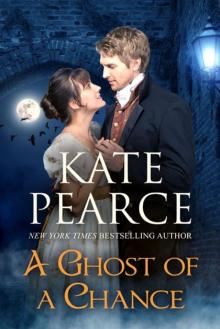 A Ghost of a Chance
A Ghost of a Chance The Maverick Cowboy
The Maverick Cowboy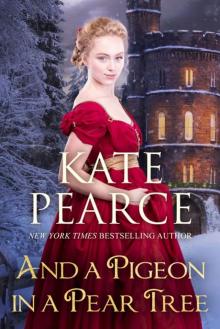 And a Pigeon in a Pear Tree
And a Pigeon in a Pear Tree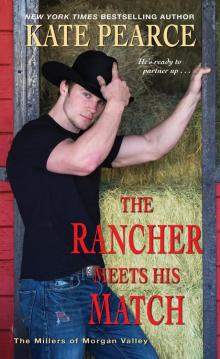 The Rancher Meets His Match
The Rancher Meets His Match A Christmas Brothel: A Set of Canterbury Christmas Tales
A Christmas Brothel: A Set of Canterbury Christmas Tales The Cowboy Lassoes a Bride
The Cowboy Lassoes a Bride The Second Chance Rancher
The Second Chance Rancher Sweet Talking Rancher
Sweet Talking Rancher The Last Good Cowboy
The Last Good Cowboy The Rancher's Redemption (The Millers of Morgan Valley Book 2)
The Rancher's Redemption (The Millers of Morgan Valley Book 2) The Billionaire Bull Rider
The Billionaire Bull Rider The Duke of Debt
The Duke of Debt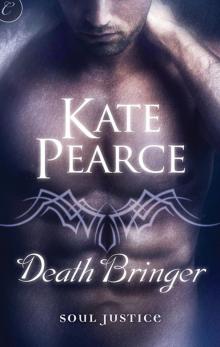 Death Bringer sj-2
Death Bringer sj-2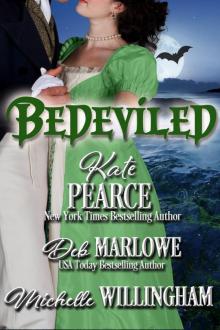 Bedeviled
Bedeviled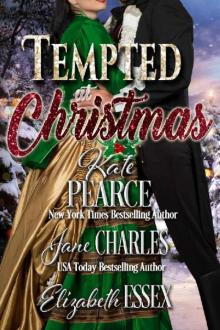 Tempted at Christmas
Tempted at Christmas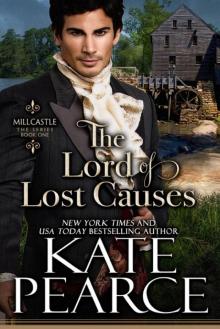 The Lord of Lost Causes
The Lord of Lost Causes Vikings Unleashed: 9 modern Viking erotic romances
Vikings Unleashed: 9 modern Viking erotic romances